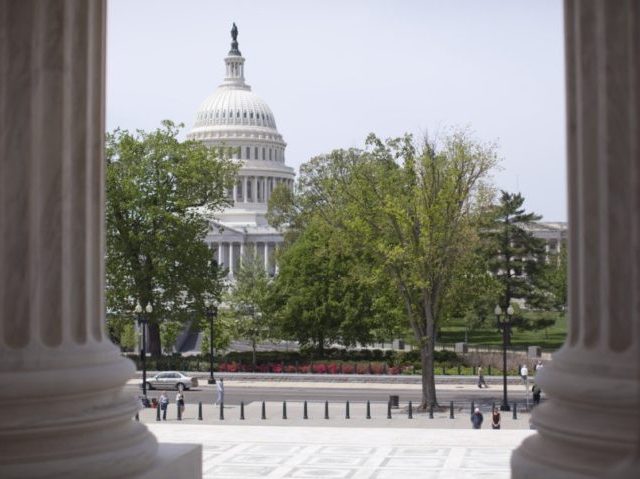House Republicans took an important step forward for tax reform on Thursday when they passed the long-awaited budget resolution. But the GOP may now find it has walked into a minefield.
The tax reform proposal was intended to be a consensus document, reflecting the views of both the Trump White House, Senate Republicans, and House Republicans. It was put together behind closed doors for months by the so-called Big Six: Treasury Secretary Steven Mnuchin and National Economic Director Gary Cohn representing the White House, House Ways and Means Committee chair Kevin Brady, Senate Finance Committee chair Orrin Hatch, House Speaker Paul Ryan, and Senate Majority Leader Mitch McConnell. They called their plan a “unified framework.”
But it is quickly emerging that Republicans are anything but unified on tax reform.
Senator Bob Corker, who has said he will retire at the end of his current term, has been voicing concerns that the tax overhaul could add to the federal budget deficit. The Tax Policy Center’s preliminary estimate is that the bill would add around $2.4 trillion to the deficit, primarily because of revenue lost to the reductions in taxes on businesses. Some Republicans have criticized that estimate, saying that the additional economic growth sparked by tax cuts would make up some or all of the shortfall.
Corker is skeptical about the economic growth claims and has said he will oppose a tax bill that adds to the deficit.
“Unless it reduces deficits and does not add to deficits with reasonable and responsible growth models, and unless we can make it permanent, I don’t have any interest in it,” Corker said at a budget meeting.
It is unlikely that the Joint Committee on Taxation, which analyzes tax bills for their revenue effects, will say that the current framework does not add to the deficit. Under most dynamic scoring models that would include new revenue from economic growth, the framework still adds to the deficit.
Corker is not alone. There are many deficit hawks on Capitol Hill, lawmakers who worry that adding to the federal debt is fiscally “irresponsible.” Corker is just more vocal than most, in part because he’s a “more vocal” kind of guy and in part because his announced retirement gives him the freedom to speak his mind.
Many of these fiscal hawks think of taxes as the government’s revenue that can be spent responsibly and look at debt as a somewhat illegitimate means to fund the government. Few seem to realize that deficits are funded by the voluntary purchases of savings bonds by the private sector, making it a purchase of a financial product and closer to what a private sector business would call revenue, while taxes are represent confiscatory funding. That’s like Apple not counting iPhone sales as generating revenue and instead only counting payments made by patent infringers to settle intellectual property cases.
To make tax reform revenue neutral, Republicans would have to raise other taxes or pair tax cuts with spending reductions. The latter is all but impossible as it would vastly complicate passage of the bill and would require lawmakers to vote against popular spending items or propose cuts to entitlements like Social Security, something Trump has said he would oppose.
Raising taxes is also fraught. The Big Six framework already proposes a number of provisions that would raise some taxes, mostly by cutting out itemized deductions on individual returns. According to the Tax Policy Center, these would amount to nearly $3.2 trillion over the next decade. Repealing some business tax preferences and closing loopholes would add another $393 billion to federal coffers.
This too may threaten the viability of the framework, however. Republican lawmakers from New York, New Jersey, California and other high-tax states have begun to warn that they will not vote for a bill that ends the deductibility of state and local taxes. Residents of those states who itemize their taxes, primarily wealthier residents who are often supporters and donors to the Republican representatives in those states, might see their tax bill rise if the deduction were taken away. Ending the deduction would also make it more expensive for state governments to tax and spend.
“The votes [to pass tax reform[ won’t be there,” said Rep. Peter King, the Long Island Republican. King voted against the budget resolution to send a signal about how seriously he takes the issue.
If the state and local tax deduction survives, however, it would add another $1.5 trillion to the deficit, according to the Tax Policy Center. Which would likely be a poison pill for the deficit hawks.
So what about trying to raise other taxes? That would likely alienate Senator Rand Paul, who has already complained that the Big Six framework could raise taxes on many middle-class families. Paul has said he will await “final details” before making a decision. But he has clearly signalled that he will oppose any attempt to make up the deficits that might be created by an overhaul’s tax cuts with tax hikes on middle-class Americans.
The tax bill is not yet doomed. Republican leaders believe that failing to pass a tax bill is an existential threat to their Capitol Hill majorities. After so many years of campaigning on tax reform and promising middle-class tax cuts, that would be a failure many believe could cost the GOP control of the House and possibly the Senate. Even the White House would be at risk.
Yet many Republicans also believed that repealing and replacing Obamacare was a “must do.” Now they find themselves forced to vote for funding to keep Obamacare from collapsing.

COMMENTS
Please let us know if you're having issues with commenting.